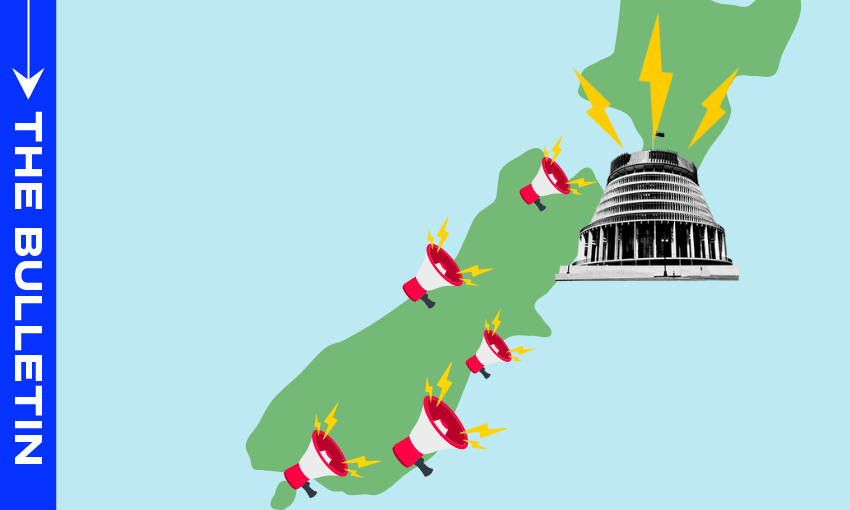It’s been a long-standing catch-cry, but the 35,000-strong march in Dunedin suggests the South is done with being ‘forgotten’ and will remember, writes Anna Rawhiti-Connell in this excerpt from The Bulletin, The Spinoff’s morning news round-up.
To receive The Bulletin in full each weekday, sign up here.
The ‘forgotten’ south
“[Insert party or current government] has forgotten about [insert region]” is a recurrent political diss track. Labour leader Chris Hipkins accused the current-day government of forgetting about the South Island in July. Act leader David Seymour said the same of the then Labour government in December 2022, pointing out that of the “top 10” cabinet ministers, only two were from the South Island. Matt Doocey is the only minister inside this government’s current cabinet from the South Island.
Cantabrians have maintained a steady“forgotten about” drumbeat since the earthquake in 2011. Before the news about Dunedin hospital, the government’s National Land Transport plan was the focus of cries of unfair resource allocation in the South Island.
Orchestrated effort brings 35,000 out to march
Following the announcement last week that the government may downgrade Dunedin’s proposed new hospital to keep it within its current funding appropriation, all forces rallied to make sure the voice of Dunedin was heard. The ODT has been doing what a local print masthead does best at times like this, running two incredibly strong front pages.
As The Spinoff’s Tara Ward notes in this brilliant on-the-ground report from Sunday’s protests, the Otago Regional Council put on free buses to make travel into the city centre easy. The Dunedin city council is at the forefront of the “They save, we pay” campaign, leading the way with a protest song sung to the tune of the old Carisbrook anthem, “Welcome to the house of pain”. An estimated 35,000 people turned out to march on Sunday, making it clear they believe the government has broken an election promise. By comparison, one of the biggest protest marches in this country’s history saw an estimated 40,000 people marching in Auckland to protest the government’s proposal to mine on conservation land in 2010.
What now?
RNZ has a great explainer and timeline on the Dunedin hospital rebuild project to date. Both health minister Dr Shane Reti and Prime Minister Christopher Luxon have said they understand the frustration and remain committed to delivering “a good hospital for the people of the South”. Luxon reiterated yesterday that it must remain within budget, with a “blow out” figure of $3b cited. The project is to be delivered within its current appropriated budget ($1.88b), and urgent advice is being sought to ensure that happens.
Dunedin mayor Jules Radich told RNZ the $3b figure was an exaggeration and that “They’ve included in that things like carparking and pathology and other services that were never in this scope, and were taken out of the scope two years ago.” He called the report commissioned by the government on costs a “smokescreen” and said the fightback is just beginning.
While Dunedin is a Labour stronghold, the area the hospital serves as a tertiary healthcare provider extends beyond Dunedin’s red borders and spills into the huge Southland electorate, which, amid electoral boundary reshuffles, has remained a National stronghold. To the north, National’s Miles Anderson holds Waitaki. Clutha District mayor Bryan Cadogan is joining Radich in the pushback on the figures being cited, telling RNZ’s Checkpoint last night that he wants the government to “show us the figures”.
West Coast, Timaru, Picton and Invercargill also have beef
In addition to protests in Dunedin, West Coast residents took to the streets in Westport on Saturday to protest against the region’s “dire” lack of health care services.
In Timaru, workers at the Alliance Group’s meatworks learned about a proposal to close the Smithfield processing plant, affecting about 600 staff. Federated Farmers is blaming land use changes. Minister for rural communities Mark Patterson said it was “pretty foreboding” for Timaru and the surrounding districts. “It’s really concerning; it’s a wake-up call. We as a government have got to take this seriously,” he said.
No mention was made of a plan for the Interislander ferry in the government’s plan for the fourth quarter released yesterday. After the iRex plan was cancelled in December, the decision was described as a shock to people in Picton.
Topping off a batch of bad news yesterday was Air New Zealand’s announcement that it would cease direct flights between Wellington and Invercargill in January. Travellers will now need to stop in Christchurch, adding 35 minutes to the trip, casting the productivity gains being cited around removing blanket speed limits on our roads in a slightly different light.
